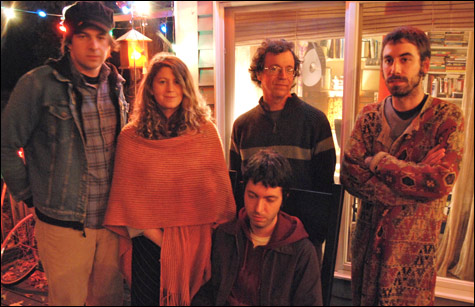
BAND OF VOICES: Fire on Fire. |
It's hard not to envy the many, far-flung listeners who will have their first exposure to Fire on Fire through The Orchard, the band's full-length debut on Michael Gira's Young God Records. Granting their taste for the clamor of five raw, loud voices singing raucous folk songs in theatrically exaggerated harmony, the experience is likely to be a kick. For those of us who have been following the group since they mutated away from their not-so-humble beginnings in Cerberus Shoal, The Orchard arrives in our mailboxes (order your copy of the 1000-edition run from younggodrecords.com) with a thud and, an hour later, a grateful sigh of relief.
The band's songwriters-in-the-round ethic seems almost coyly misleading here, as most of these songs only become fully formed with the entire group's input. "Sirocco" begins with plaintive moans and a jaunty arrangement of banjo, upright bass, and accordion. Caleb Mulkerin's trenchant, foreboding howls ("Paradise we agreed was a portrait of the two of us/While the pictures are fragile and the ivy is taking the trees") breathlessly slash through the harmonies.

A standby of Chriss Sutherland's live sets, "Heavy D" succeeds in similar terms, gaining welcome compositional momentum with the band's robust treatment. The title track, led by a direct and unusually emotive Micah Blue Smaldone, fuses ramshackle charm (maintaining the clack of Smaldone's bass strings snapping back on the instrument's neck is one of many excellent production decisions throughout the album) and incantatory sentiments into an album highlight. "The Orchard" is the most dramatic example of the tie that binds the five members' individual styles, an urge to reckon with cursed pasts and uncertain futures.
The Orchard only falters in its second act, where a short stretch of songs behave more like Fire on Fire "treatments" than collaborative efforts. The guitar and bass that match most of Chriss Sutherland's words throughout "Flordinese" bog down the vigor of his vocals. Another quick Sutherland track follows before Mulkerin's nostalgic and lovely (but overlong) "Toknight." Shortly after, Tom Kovacevic's oud and his "Fight Song" offer up the album's best arrangement — warm and genuinely uplifting, it swells like a sunrise — but its harmonies are wanting. (This stretch is where I envy newcomers to the band; it's probably not a coincidence that this relatively sleepy chunk of the album consists of many of the group's most familiar songs.)
Here and elsewhere, though, Colleen Kinsella proves herself The Orchard's vibrant heart. Her pristinely double-tracked vocals on "Assanine Race" are a dazzling match for the song's slithering, free-associative lyrics, which end on a knockout punchline: "I gotta keep up with Mr. Jones/And the devil who eats my brother's bones/When I find him I'll make him wait/As long as my very first date."
Smaldone's bass touches on both jazz and classical notes on the momentous "Squeeze Box," where Kinsella scats, purrs, pleas, and screeches her way through a barrage of evocative phrases, hop-scotching her way through fears and implications rendered with hyper-sensory imagery ("I'll never wait again/Sucking smoke from nostril to ear/An early wedding portrait for any day").
Sutherland's bleak, unhinged ballad, "Tsunami" — which both lives up to its title and, in its similarities to "Something in the Way," suggests that Sutherland ought to lead a Nirvana "Clash of the Titans" band — leads into Kinsella's nine-minute album closer, "Haystack." After reciting urgent expressions of grief, Kinsella arrives at a refrain of "There's so many/So, so many/Ways in which to feel the sun." Small touches — heavy exhales, the noise of a baby, subtle harmonizing from the boys in the band — are peppered into the song's repeating chords, easing this fine, vividly produced album into the sublime.
Christopher Gray can be reached atcgray@thephoenix.com.